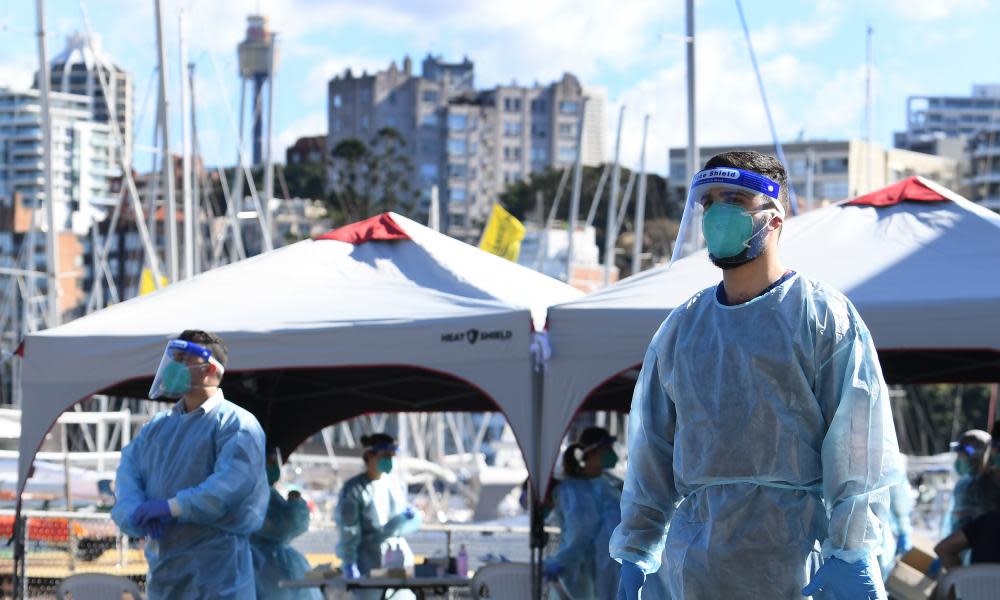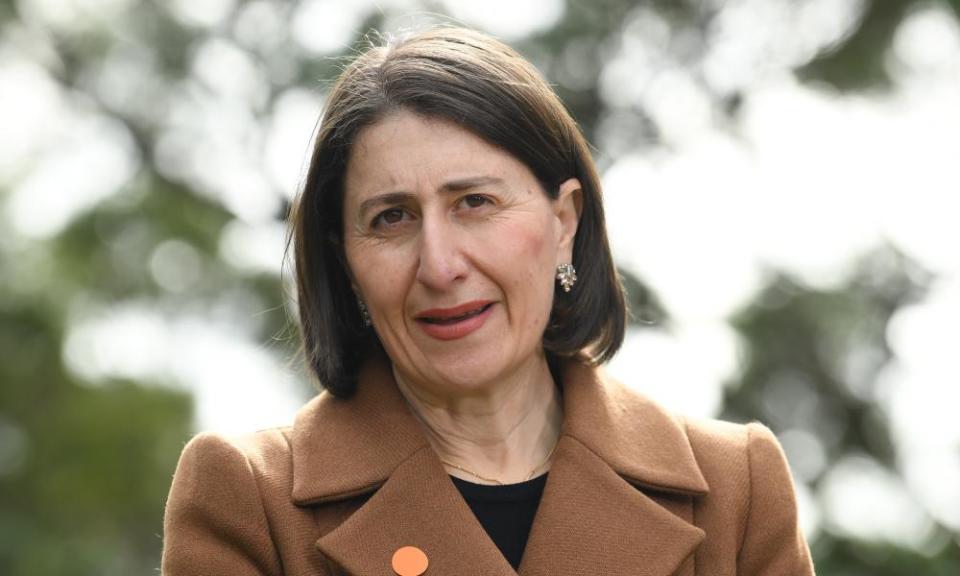NSW says coronavirus outbreak 'on knife’s edge' amid 19 new cases and growing clusters in Sydney's east

Queensland has once again closed its borders to Sydney as health authorities in New South Wales admit control of the Covid-19 pandemic remains “on a knife’s edge” amid growing clusters of cases in the state.
Health authorities in NSW have repeatedly warned that while the number of cases recorded in the state has remained relatively stable since a cluster emerged out of the Crossroads hotel in Casula at the end of June, the possibility of a wider outbreak remains potent.
That message was further amplified when the NSW health department added three more cases to the cluster in the suburb of Potts Point in Sydney’s east on Tuesday evening.
Related: NSW Covid-19 hotspots: list of regional and Sydney outbreak locations
The state recorded 19 new cases to 8pm on Tuesday night, with two returned overseas travellers and the rest linked to existing clusters, including a funeral service in western Sydney, the Thai Rock restaurant in Wetherill Park and the outbreak in Potts Point.
It prompted Annastacia Palaszczuk to announce Queensland would close its state border to all of greater Sydney from 1am Saturday amid its first two confirmed cases outside of hotel quarantine since May.
The two women entered Queensland from Victoria via Sydney before being diagnosed with Covid-19 and police were questioning why they were active in the community for eight days when they should have been self-isolating.
Announcing the closure, Palaszczuk declared “we must protect Queenslanders”.
“Your safety comes first and we are in extraordinary times at the moment. We have to do everything we can,” she said.
The NSW premier, Gladys Berejiklian, took a swipe at her Queensland counterpart, telling reporters at a press conference in Sydney that it “hurts the smaller states” to shut themselves off from NSW and saying “it would have been nice if she told me” about the decision.
“That’s a matter for the Queensland government, and a matter for her. I note the cases they’ve had up there announced today are all from Victoria, and the case in South Australia is from Victoria,” she said.
“In the end it hurts the smaller states when they don’t interact with NSW. It hurts us less if you talk about the economy ... It’s obviously up to other jurisdictions on what decisions they take. The only challenge for NSW is limited freedom of movement for residents but if you’re talking about the economic consequences it hurts Queensland or South Australia or WA much more than it hurts NSW.”
Asked if she was informed of Queensland’s decision prior to the announcement, Berejiklian said: “No, no, nope, no.”
“It would have been nice if she told me, but that’s fine,” Berejiklian added.

The trend of cases in NSW has slowly risen since a Melbourne freight industry worker visited the Crossroads hotel in Casula on 3 July. While authorities have so far managed to limit the spread of the virus, the state’s deputy chief medical officer Jeremy McAnulty conceded on Wednesday that the situation remained “on a knife’s edge”.
“We are at a knife’s edge, a very critical point in the cases,” he said.
“The good news is that we are able to link them all together. [This means] we can understand the transmission dynamics and the people at risk.”
Public Health Association of Australia chief executive Terry Slevin told Guardian Australia the steady case numbers in NSW were a sign the state’s contract tracing and health systems were “working reasonably well”.
“The bottom line is you’ve got two of Australia’s most populous states in Victoria and NSW where there’s more than an order of magnitude of difference in terms of the number of cases diagnosed over the past couple of weeks,” he said.
“That suggests the effort that NSW health are putting in when you presume all other things being equal have been successful. While the numbers are in the teens rather than the hundreds you’ve got to think the system is working reasonably well.”
But Slevin said it was right for health authorities to urge residents to remain vigilant, and said additional measures such as mandatory masks was something the government “need to give consideration to”.
“Everybody in NSW and particularly those in high density populations, Sydney being the obvious example, should think about how they might best protect themselves and the people round them from community spread,” he said.
“Masks should be one of the tools. Should it go to mandatory use? That’s something public health authorities and the government need to give consideration to. Clearly it’s needed and justifiably so in Victoria but I suspect that most people in NSW have now given serious thought to getting access to masks and should certainly consider using them particularly if they anticipate going into crowded environments.”
Patrons of another Sydney business have been asked to look out for symptoms after a nail salon worker at Professionail, within Westfield Hurstville, tested positive for Covid-19. The woman worked at the salon on 22 and 23 July. Her case has been linked with the western Sydney funeral cluster.
Related: ‘You can’t switch off’: the Covid marshals policing Sydney's pubs
NSW has so far resisted talk of the lockdown measures taken in the worse-hit state of Victoria, but on Wednesday Berejiklian announced new rules for gyms that make it a requirement to have a Covid safety plan and hygiene marshal on shift at all times.
But Berejiklian warned tougher measures were not out of the question.
“We have the opportunity to get through the next few weeks and continue on our strong path,” she said.
“I’d much rather be harder now than have to deal with a worse situation in a few weeks time.”
Also on Wednesday the NSW education minister, Sarah Mitchell, said school principals have been instructed to allow teachers to wear masks in state schools if they wish.
“We have made it very clear that masks aren’t required, but we’ve also let our principals know that if any of our teachers want to wear their mask they can and they should be supported by their school,” Mitchell told 2GB this morning.

 Yahoo News
Yahoo News 
